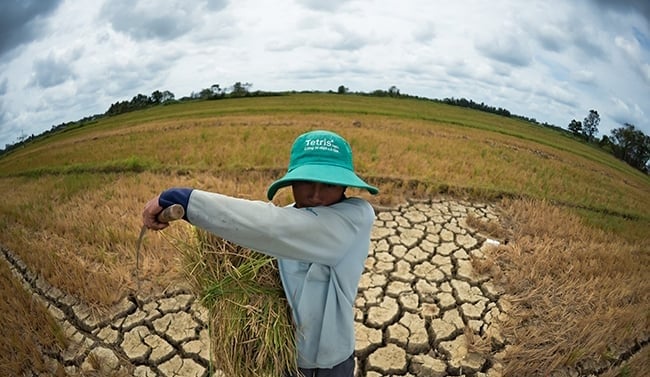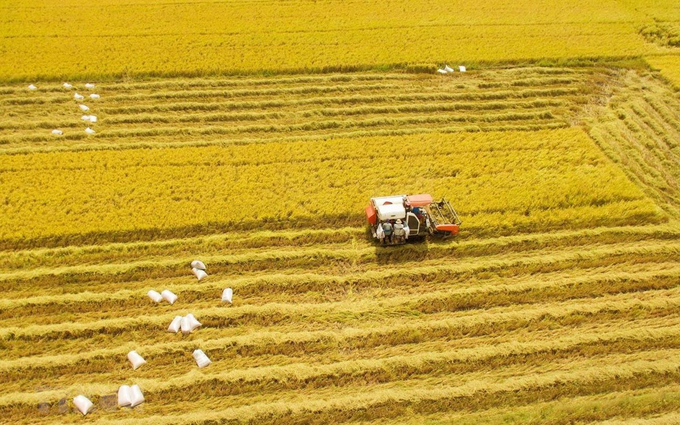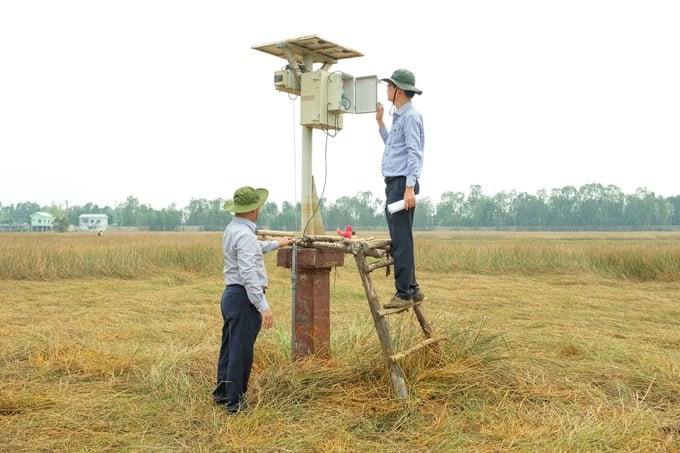May 30, 2025 | 17:07 GMT +7
May 30, 2025 | 17:07 GMT +7
Hotline: 0913.378.918
May 30, 2025 | 17:07 GMT +7
Hotline: 0913.378.918

Climate change is causing severe drought in the Mekong Delta. Photo: Manh Linh.
On March 18th, the Prime Minister accepted a proposal for the "Mekong Delta Climate Resilience and Integrated Transformation Project".
The project's total projected investment is USD 274.3 million, or 6,579 billion VND, with a World Bank (WB) loan of USD 205.5 million, or 4,932 billion VND. The non-refundable contribution from Australia is 10 million AUD, which is comparable to USD 6.5 million or 156 billion VND. The remainder comes from corresponding capital from the central budget.
As a result, the project's four components seek to improve the climate resilience of agricultural production operations and rural people in selected Mekong Delta regions. The Plain of Reeds (Dong Thap, Tien Giang, and Long An provinces) is expected to be impacted, as is the Southwest of the Hau River (Soc Trang, Bac Lieu, and Hau Giang provinces), the central area of the Ca Mau Peninsula (Hau Giang, Soc Trang, Bac Lieu, Can Tho, Kien Giang, and Ca Mau provinces), and the coastal areas of Tra Vinh and Ben Tre.
Within Component 1, the project focuses on building capacity, institutional frameworks, and decision support systems, with two sub-projects aimed at improving data, monitoring systems, management tools, and strengthening regional coordination in agricultural and rural development planning and investment.

The project's total projected investment is USD 274.3 million, or 6,579 billion VND, with a World Bank (WB) loan of USD 205.5 million, or 4,932 billion VND.
Component 2 will address regional climate resilience infrastructure investment with sub-projects such as minimizing the risk of riverbank erosion in the Mekong Delta region, upgrading climate resilience infrastructure and transforming the Mekong Delta region, and completing water control systems to enhance climate resilience capacity and serve agricultural production transformation in the Southwest region of the Hau River.
Component 3 promotes varied livelihoods and efficient rural economic adaptation to climate change. The fourth component contains material on project management, monitoring, and assessment.
The "Mekong Delta Climate Resilience and Integrated Transformation Project" achieves certain goals via the utilization of World Bank loan capital and non-refundable Australian government grants.
Accordingly, the project aims to build and improve data, monitoring systems, management tools, and enhance regional coordination; restore flood absorption capacity and the environment in flood-prone areas; control floods and salinity intrusion for key fruit-growing areas and meet the strong demand for conversion from other production types to fruit trees; minimize the risk of riverbank and coastal erosion; support stable freshwater supply and promote diversified livelihoods.
According to the authorized decision, the Ministry of Agriculture and Rural Development (MARD) is completely accountable to the Prime Minister and competent inspection authorities for the proposal's content as well as its compliance with legal project documentation requirements. MARD is in charge of assessing investment items to reduce duplication, waste, and inefficiency when generating the Project Pre-feasibility Study Report.

One of the components aims to upgrade climate resilience infrastructure and transform the Mekong Delta region, and complete water control systems to enhance climate resilience capacity. Photo: Quynh Chi.
According to the lender, as of October 4, 2022, the World Bank has granted USD 25.16 billion in grants, concessional loans, and credit to Vietnam via 216 programs since 1993. Vietnam's current portfolio includes 22 ongoing projects funded by the International Development Association and the International Bank for Reconstruction and Development, for a total net commitment of USD 4.74 billion.
According to the Vietnam Country Climate and Development Report, which was issued by the World Bank in July 2022, the country would need to spend around USD 368 billion between now and 2040 to establish a climate resilient and low-carbon economy.
Amid climate change difficulties, foreign partners are assisting Vietnam in altering agricultural methods and promoting sustainability in the Mekong Delta.After the Prime Minister of Vietnam released the National Green Growth Strategy for the period of 2021-2030 with a vision to 2050 and the National Action Plan on Green Growth for the period of 2021-2030 on October 1, 2021 and July 22nd, 2022, respectively, the Ministry of Agriculture and Rural Development of Vietnam worked out an action plan to implement the National Strategy on Green Growth for the period of 2021-2030 on September 12, 2022 and make efforts.
Translated by Dieu Linh
/2025/05/29/5625-12-214801_567.jpg)
(VAN) Provincial mergers in the Mekong Delta promise to streamline administration, expand inter-provincial raw material areas, and foster close linkages in agricultural value chains, benefiting both businesses and cooperatives.

(VAN) Merging Mekong Delta provinces contributes to the expansion of agricultural raw material areas, addressing previous constraints caused by provincial boundaries. Additionally, this expansion will reduce costs and strengthen linkages between businesses, cooperatives, and farmers.
/2025/05/29/1043-2-153730_145.jpg)
(VAN) The Government's policy to merge provincial-level administrative units opens up major opportunities for the Mekong Delta region to reshape its agricultural development strategy toward large-scale production, effective regional linkages, and sustainability.

(VAN) The mutual export of agrifood products between the European Union (EU) and the United Kingdom (UK) must occur again without certification, border controls or other red tape. This was agreed at the UK-EU summit.
/2025/05/22/5121-2-173645_677.jpg)
(VAN) NBSAP Tracker identifies strengths and areas for improvement in the National Biodiversity Strategy, based on each region’s priorities and capacities.

(VAN) The draft amendment to the Circular on rice export trading stipulates a periodic reporting regime for rice exporting enterprises.

(VAN) Dong Thap farmers attained an average profit margin of 64% during the summer-autumn 2024 crop (first season), while An Giang and Kien Giang farmers followed with 56% and 54%, respectively.